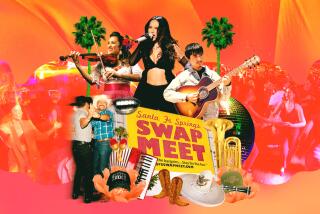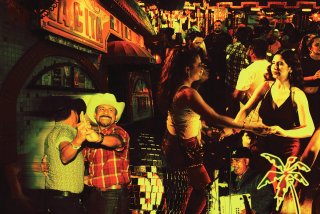Critic’s Notebook: El Sistema for all, U.S. kids too
Musically, Venezuela is like no other place on Earth.
Along with baseball and beauty pageants, classical music is one of the country’s greatest passions. In the capital, Caracas, superstar Venezuelan conductor Gustavo Dudamel is mobbed wherever he goes. Classical music teeny-boppers run up to him for autographs when he walks off the podium at concerts. The state-run music education program, which is known as El Sistema and from which Dudamel emerged, is the most extensive, admired and increasingly imitated in the world. One of its nearly 300 music schools for children, or núcleos, is deep in the Venezuelan Amazon, reachable only by boat.
Foreign visitors who stream into Caracas to observe El Sistema in action invariably leave Venezuela amazed. I am no exception, having tagged along with the Los Angeles Philharmonic for its recent eight-day Caracas Mahler Project residency. Nor were the L.A. Phil musicians, having performed with and coached impressively aspiring younger Venezuelans.
Full coverage: Classical music, jazz and opera
So pervasive is El Sistema in this society that if you were to ask the average Venezuelan whether he or she thought classical music is dying, you might be questioned about what planet you are on. So strong is the Sistema lockbox that this program is equally supported by rich and poor, the political left and right. President Hugo Chávez allots it $100 million a year and regularly promises more. The opposition party knows better than to oppose music education in the upcoming fall election. For a reality check, imagine President Obama demanding a $1.2-billion music education system under the rubric of social welfare, only to be challenged by Ron Paul insisting that Congress allocate an even greater sum for socialized music.
Is it replicable?
It should be obvious, then, that El Sistema is a uniquely Venezuelan miracle and hardly replicable elsewhere. I found it downright surreal to visit La Rinconada — a núcleo for 2,000 children, most of whom come from dangerous surrounding barrios — on Feb. 14, the same day the Los Angeles Board of Education met to consider a shocking proposal that would eliminate arts education from the elementary curriculum. But it is not only us. A combination of the international financial crisis and an increasing emphasis on popular culture has meant that cutbacks are happening even in such countries as Finland and Japan, where music has long been a core part of early schooling.
The populist, anti-elitist Sistema pedagogy is also remarkably singular and difficult to import to the United States. The basic tenet of José Antonio Abreu, the revered founder of El Sistema, is the universal aspect of music. He likes to say that music is a human right. That’s an effective, politically expedient slogan. But what he has demonstrated on a greater scale than ever before is that music is not so much a right as a given. El Sistema is not about talent, ingeniously effective system though it may be for discovering and fostering musical talent. The truly revolutionary aspect of El Sistema is its proof that everyone has a capacity for music.
For Abreu, music is meant for all, and he really does mean all. Although he doesn’t talk about it in quite these terms, we’re wired to learn it, just as we are for language, and he has proven that if we start early enough and are effectively taught, we all acquire basic musical ability.
Team effort
What El Sistema does is take children, some as young as 2, into the núcleos, where they spend their after-school afternoons learning the basics of music and playing in youth orchestras. No child for whom there is room is left behind, and that includes those with special needs. Most come from the barrios, and they are given instruments, meals and, in dangerous areas, transportation. But núcleos also attract middle- and upper-class kids who want that superior education.
The other unique aspect of El Sistema is its emphasis on music education as a social program rather than a cultural one. The nerve center for the program (which has recently changed its name to Fundación Musical Bolívar, or FundaMusical but remains branded internationally as El Sistema) is the Center for Social Action Through Music. The politically savvy Abreu, who was trained as a musician and an economist, and who once worked in government, understood when he started with an ensemble of 11 in 1975 that if he wanted support from the government for music education, the only way he would get it would be by promoting his work as a social program.
But it was more than that. Abreu was himself drawn to music as a social activity. He told me in a short interview last week that the part of music education he never liked as a boy was solitary practicing. It was the teamwork, the high he got from playing with others, that was always his love.
And that is how El Sistema works. Kids aren’t given private lessons and then told to go off and practice for hours. The children in the núcleos learn together playing in kiddie orchestras. The older children help coach the younger ones. They rehearse, rehearse, rehearse, every day. They grow up together. The metaphor everyone in El Sistema uses is family.
To a great extent this is a reflection of life in Venezuela. Crime in Caracas has reached the point that it is simply too unsafe to live as a loner. If you want to go anywhere at night, for instance, you had better go in a group.
A system to it all
Abreu has also tapped into something else strongly Venezuelan, which is national pride. As El Sistema has grown, so have the sizes of the orchestras and their extraordinary playing. The children are taught teamwork, honing their ensemble skills as a soccer team might. This may also explain the Venezuelan attraction to big orchestras. When 650 preteens play in sync, as I heard them do in super-sized bits of Handel’s “Water Music,” Abreu’s message gets very much hammered in.
The solidarity is enhanced through standardization. All núcleos follow the same teaching methods and teach the same standard repertory. That means that the more than 1 million kids who have gone through the núcleo process are all literally on the same page. In a country where the murder rate is so high that the first priority of the well-off is to protect themselves from the poor, the large orchestras for some are their communities.
This might rankle American educators who teach creative spelling and the like, but the fostering of individual creativity is simply not, for Abreu, a goal. Nor are the núcleos equipped to. He does, however, insist that through first obtaining basic skills and technique the gifted few will naturally emerge. Those are then encouraged to develop their own musical personalities. Dudamel, for whom Abreu became a surrogate father in El Sistema, is the prime example of how this can happen.
Nor is it only the deep-pockets political support, the long and endless daily rehearsals, the lock-step learning and the exclusive emphasis on music that run counter to how education in general is approached in the U.S. The socialist politics of El Sistema might be further cause for suspicion in our country. The umbrella FundaMusical Bolívar operates as a ministry of the president, so it is hardly surprising that Chávez will now and then expect one of the many orchestras to participate in national activity. Eduardo Méndez, the young executive director of FundaMusical, explained to me that El Sistema functions outside of politics. It is, he said, a state program, not the representation of a specific government. For some both inside and outside of Venezuela, though, the idea of serving Chávez’s controversial regime is uncomfortable.
Still, FundaMusical is growing at such a great rate and sending out its international tentacles with such tenacity that cultural differences must somehow be dealt with. In Venezuela, concert halls and learning centers are going up throughout the country. In Dudamel’s hometown of Barquisimeto, no less than architect Frank Gehry and acoustician Yasuhisa Toyota are designing concert halls, and Toyota is also in charge of the acoustics for two new halls and a conservatory that will triple the size of the Caracas FundaMusical headquarters.
The former Simón Bolívar Youth Orchestra in which Dudamel once served as concertmaster and of which he was music director for a decade has now turned professional as the players have matured. Dudamel remains at its head. New youth orchestras, and a number of exciting young conductors, are filling the student gap. Two conductors from El Sistema slightly younger than Dudamel — Christien Vásquez and Diego Matheuz (the new music director of La Fenice in Venice, Italy) — are building major international careers.
Meanwhile, the professional Bolívars are forging new grounds, fueled by Dudamel’s international celebrity. Representatives from La Scala, the Salzburg Festival and the Lucerne Festival all came to Caracas for the L.A. Phil’s Mahler concerts and to make deals. One will be for a close collaboration between La Scala and FundaMusical. La Scala will ship productions from Milan to Caracas, and Dudamel, a regular at La Scala, also plans to bring the Bolívars to Milan to play in the pit at the famed opera house.
The famous son
Dudamel’s international career ultimately is giving the Sistema phenomenon more and more prominence, and that, in turn, is inspiring more and more places to create their own versions of El Sistema. Méndez says that FundaMusical is indeed adaptable. The learning methods come from many traditions, including the Suzuki method and one devised by German composer Carl Orff, and he believes that El Sistema is flexible enough that it can be tailored to individual cultures. The L.A. Philharmonic currently has active youth orchestra programs directly inspired by El Sistema. The New England Conservatory began a training program for Sistema teachers but has recently pulled back. Carnegie Hall next fall will host Dudamel and the Bolívars, with much attention paid to Sistema.
Méndez admits that government support for any El Sistema program in the U.S. would of course be a pipe dream, but he says that what works with the government in Venezuela might well work with private funding and foundations elsewhere. The idea is that everyone can make music. The how is up to us, but not the why. We must pick and choose from El Sistema to find what works for us. But the fact is that the Venezuelans’ education system is a triumph and ours is broken. We desperately need all the help we can get.
More to Read
The biggest entertainment stories
Get our big stories about Hollywood, film, television, music, arts, culture and more right in your inbox as soon as they publish.
You may occasionally receive promotional content from the Los Angeles Times.











